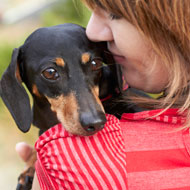Charity extends Freedom Project to Essex

As most refuges do not accept pets, the scheme allows victims of domestic abuse to leave a violent situation, knowing their pet will be safe.
A foster scheme that helps pet owners fleeing domestic violence has been extended to Essex, after police statistics revealed a 32 per cent increase in domestic crimes across the county.
The Freedom Project, which is run by Dogs Trust, places at-risk dogs with volunteer foster carers until they can be safely reunited with their owners. As most refuges do not accept pets, the scheme allows victims of domestic abuse to leave a violent situation, knowing their pet will be safe.
It has been running for 12 years in Greater London, Yorkshire and Hertfordshire, where it has helped 1,500 pets and 1,100 families to escape domestic abuse. The project is brand new to Essex, however, and the only one of its kind.
Figures obtained by a freedom of information request show Essex Police carried out 34,720 domestic abuse investigations in August 2015-2016 alone. The statistics reveal an increase of nearly a third between 2013 and 2015.
Research shows there is a link between animal abuse and domestic violence, with perpetrators threatening to harm or kill a pet to intimidate their partner into obedience. Many owners stay in a violent relationship for fear of what may happen to their pet if they flee.
Dogs Trust hopes that by extending the Freedom Project to Essex, they will be able to help even more families and pets at risk.
Sarah, a victim of domestic abuse from Essex who was helped by the project, said: "I fled domestic abuse with my two children and my dog Benny. My ex-partner never actually harmed my dog but one time he pulled out a knife during an argument and threatened to stab him. Me and my children went into a refuge but we couldn’t take Benny with us so I needed to find somewhere safe for him.
"When we fled we lost everything but we couldn’t lose our dog as well. I referred Benny to the Freedom Project which was upsetting but also a relief at the same time as I knew he would be well looked after. We have a new home now and Benny is back with us. After everything we’ve been through, getting him back was the best feeling in the world."
Owing to the high demand for the service, Dogs Trust is urgently looking for volunteers with experience of looking after dogs, who are home during the day and can look after them for an average of six months. All dogs' expenses are covered by the charity.
If you live in Essex and would like more information about volunteering or accessing the project, visit: www.dogstrustfreedomproject.org.uk email: freedomproject@dogstrust.org.uk or call: 0800 298 9199.



 The Veterinary Medicines Directorate (VMD) is inviting applications from veterinary students to attend a one-week extramural studies (EMS) placement in July 2026.
The Veterinary Medicines Directorate (VMD) is inviting applications from veterinary students to attend a one-week extramural studies (EMS) placement in July 2026.